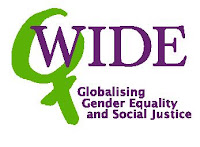 8 March, the International Women’s day is an occasion for women all over the world to celebrate and to unite for social and gender justice, environmental sustainability, peace and equality and make their voices heard. “We are in the midst of the most serious crises since decades. The lives and livelihoods of hundreds of millions of women and men, girls and boys worldwide are threatened by the complex set of the financial, economic, energy, food, climate, and inequality crisis”, the Brussels based Women in Development Europe network (WIDE) says in a statement. WIDE is deeply concerned that again women will have to carry the major burden of this multiple crises: indeed, prior economic crisis in Latin America and in Asia in the 1990’s, have largely affected women and children by increased unemployment and decreased household incomes, cuts in government costs on social services and most of all additional reproductive and unpaid care work.
8 March, the International Women’s day is an occasion for women all over the world to celebrate and to unite for social and gender justice, environmental sustainability, peace and equality and make their voices heard. “We are in the midst of the most serious crises since decades. The lives and livelihoods of hundreds of millions of women and men, girls and boys worldwide are threatened by the complex set of the financial, economic, energy, food, climate, and inequality crisis”, the Brussels based Women in Development Europe network (WIDE) says in a statement. WIDE is deeply concerned that again women will have to carry the major burden of this multiple crises: indeed, prior economic crisis in Latin America and in Asia in the 1990’s, have largely affected women and children by increased unemployment and decreased household incomes, cuts in government costs on social services and most of all additional reproductive and unpaid care work.WIDE believes that the current financial and economic crisis signals the failure of the mainstream economic system - that favours large capital interests at the expense of people's lives and sustainable livelihoods - to respond to the enormous global challenges. WIDE understands current situation as an opportunity to call for a change of the unsustainable, gender-blind economic development system that is built on women’s subordination. In this context, WIDE urges the international community:
* to promote people–centered sustainable development including empowerment of women, social justice and equality as well as an equal distribution of resources;
* to acknowledge and value in economic terms the unpaid and invisible care work and contribution of women to economic and social development as being essential for the reproduction of the labour force and the well-being of societies;
* to pursue a truly cooperative and participatory solution to the current systemic crisis where all countries are able to voice the concerns of their most vulnerable groups;
* to increase political and financial support to women’s networks and organizations working for social, economic and political change in the South, East and West.


No comments:
Post a Comment